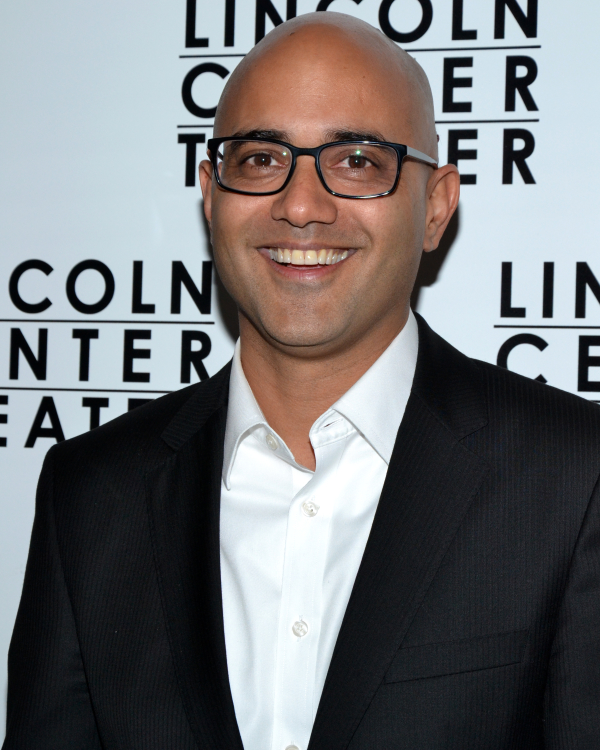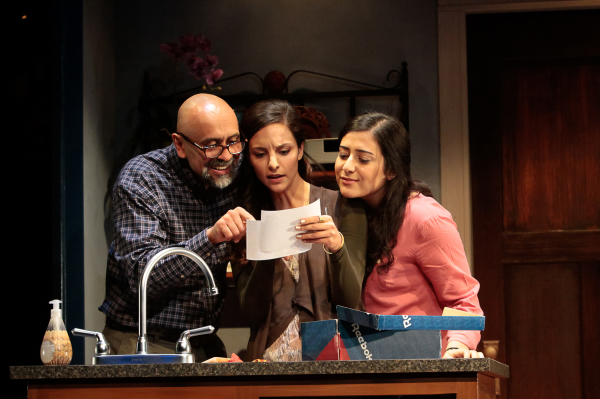Between Disgraced and The Who & the What, Ayad Akhtar Is One Busy Playwright

(© David Gordon)
To call Ayad Akhtar a busy playwright is sort of an understatement. Since winning the 2013 Pulitzer Prize for his play Disgraced, the Pakistani-American author has busied himself with his next theatrical turns, and they're coming in rapid succession. First up is The Who & the What, a drama at Lincoln Center Theater's LCT3 program about a brilliant Pakistani-American novelist whose family is torn apart when she finishes a controversial book about women and Islam. Next up is The Invisible Hand, a thriller that will premiere later this year at New York Theatre Workshop. In between is the recently announced Broadway premiere of Disgraced, which will play the Lyceum Theatre this fall. Akhtar gave TheaterMania the lowdown on where his latest projects are headed and how important it is to have downtime within all the creativity.
The Who & the What seems so familiar and yet so different all at once. It's a family play with characters we've never really seen before onstage. Where did this play come from?
I saw an ad for Kiss Me, Kate, and I got obsessed with this idea of gender politics in Taming of the Shrew corresponding to the gender politics of my culture. Those gender politics don't make sense to an American audience in this day and age. How interesting to use that dramatic setup as a circumstance to write. I had just finished The Invisible Hand, which is a thriller, I had finished Disgraced, which is a tragedy, and I said this would be a comic take on the same identity issues, traditional versus modern, Islamic and American.
You do see that a lot in the play. Was the idea of Zarina writing a book that shocks the entire community inspired by what went on with Salman Rushdie and The Satanic Verses?
Yeah, I guess, in a way. The thing that I would distinguish from The Satanic Verses is that there's a lot more love and belonging to the tradition that Zarina has than I think Rushdie has ever felt. That's not a knock to Rushdie — I admire and adore Rushdie. I just don't think he's ever felt he was speaking to the Muslim world or community. I think that's the distinction. I think Zarina is trying to question the tradition from inside, rather than stepping out and saying, "This is all bullshit and this is why," if that makes sense. I don't think her book would be any less negatively received than The Satanic Verses. If there were an actual book like this, I don't think people would appreciate it very much.
What would the response be in real life?
I think there would be familial fallout. The question of whether or not there would be a fatwa or something like that really depends on the international reach of a book. People write stuff that's offensive and nobody hears about it. Then, suddenly, some guy makes a video on YouTube and then a year later it gets translated into Arabic and that's when the sh*t hits the fan. You just don't know what the event is going to be. I spent a lot of time trying to figure out what felt like the right response to the book that would allow it to be what it should be, which is something that is tackling the larger world prism of a family, and not have it overwhelm that frame.
This is your second time working at LCT3. What do they provide you, as a playwright, that keeps you returning?
I can't even describe what a joy it is. It's very difficult to even talk about without it seeming like I'm saying politically correct things. It's such an incredible place to work. When they get behind what you're doing, you don't have to think about anything. Case in point: a $20 ticket, an off-Broadway premiere, and two and a half weeks of previews? I changed the ending twice. I've had the opportunity to watch and see what happens. It's unheard of.
It's also where Disgraced began. And now that play is moving to Broadway. Is the prospect of your first Broadway production exciting or terrifying?
All of the above. The show's never been presented to more than, I'd say, one hundred sixty people at a time. Now were going to have seven hundred people a night, if we fill the house. Who knows how it's going to play? I think there's enough space in the text for the humor to be broad enough for it to appeal to a larger audience, but I have no idea. We're gonna find out.
Tell me about The Invisible Hand, which is opening later this year at New York Theatre Workshop. You said it was a thriller?
It’s a thriller in structure. A white American investment banker working in emerging markets in Pakistan gets kidnapped by a local extremist militia. The company he works for, Citibank, can't negotiate the ransom because it's against U.S. antiterrorism laws. The second in command [of the extremist group] is this young kid from London who is Pakistani and has moved back to Pakistan to fight against the corrupt government. He realizes their captive is a guy who has trading skills, so they put him to work to raise his own ransom. Over the course of fourteen scenes, they wreak havoc on the Pakistani capital markets. It's a meditation on global finance and extremist militant religious politics and the destructive forces of globalization. I wouldn't say they're the same, but they have often similar effects even though they're coming from completely different ideology.
You're a busy guy these days.
Yeah, no kidding. [laughs] There's the other side of it, which is that, in order to do anything well, you have to have time to not be doing it. Down time, negative space, time where you're just letting stuff happen. So when you get really busy, I worry that there isn't as much creative space. But I'm nothing but grateful for everything that's happening.

(© Erin Baiano)











